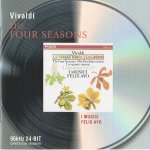The famous 1959 recording of Vivaldi’s “Four Seasons” by I Musici with Felix Ayo as violin soloist is one of the longest-standing versions of this grossly over-subscribed work. It’s also one of the best, sounding fresh and brightly-lit in this latest Philips transfer. Ensemble playing is polished, refined, and fluent. Ayo’s solo work is distinguished by pliant, firm tone and a virtuoso technique that’s tastefully employed to suit the varied stylistic needs of the music. I Musici never set out to be “authentic”, but the moderate use of vibrato, subtle ornamentation, and abrupt reaction to dynamic changes keep the ear constantly attentive. I Musici’s account is particularly good on literary/programmatic associations, so if you want to hear the music in the context of the picturesque sonnets found in the score, this might be one of your best options. For example, you’ll easily register the barking dog imitated by the solo viola in the slow movement of “Spring”. “Summer”‘s final presto is taken very fast indeed, and “Autumn” achieves a nicely-sprung “hunting” rhythm in its closing section. A fine version, also well recorded.
































